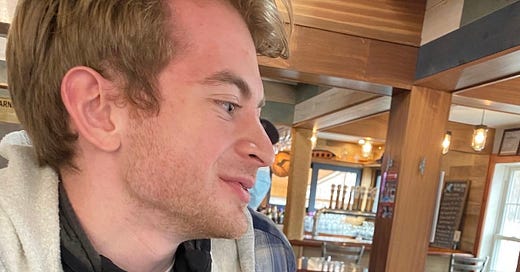My oldest son, Jonah, finished his political science major at Rutgers, and is knocking off the last couple of classes in a minor in environmental studies. He’s close enough to the finish line that he plans to juggle a real job with his remain classwork. Jonah hopes to find a sales and marketing job in one the big industries here in New Jersey - technology, pharmaceuticals, or green energy.
Over breakfast this morning, I helped prep him for his first job interview. I told him to emphasize his customer service experience at his previous jobs and the unique job preparation that comes from being a liberal arts major, like writing and thinking skills.
Jonah will hit a job in sales out of the ballpark. He’s really good at looking people in the eye, chatting with them, empathizing with their woes, and telling stories. He has good social skills. He’s a decent student and has all sorts of other awesome qualities, but it’s his easy laugh and sports banter that will take him far in life.
His younger brother struggles with all those skills that come effortlessly to Jonah. Ian doesn’t look people in the eye. He gets stressed out about dumb stuff. He has trouble batting that conversational ball over the net. He looks at his phone. He yawns without covering his mouth. He’s not flexible. He has no filter. He’s a good looking kid, but his body language is always awkward and juvenile.
We made the mistake of not correcting those problems earlier. As long as Ian got As and didn’t bother the teachers, the district pretty much overlooked him and ignored him and provided no help in this area. I didn’t realize how important all those soft skills would be until he finished high school. A student with low cognitive abilities, but good soft skills, can always get a job somewhere. But I know plenty of students with great SAT scores and all sorts of academic achievements, who never find work or achieve independence.
So, starting in September, Ian will start a new school that will support his social and emotional needs, while he gets support for college classes and teaches him job skills. Yay. It took a year and tons of advocacy to find this program for him. I’ll talk about it more later in the fall.
Soft skills matter more than SAT scores. And this isn’t just an issue for autistic people, like Ian. Plenty of typical adults have no social skills. Some careers do tolerate those with lesser social talents - academia and computer science are full of clueless geeks. But in general, social skills are essential.
If social skills are so important, perhaps schools should provide direct instruction in this area. Students could have a semester long class on Emily Post manners — pinkies out and bow to your partner and salad fork instruction and all that. Students aren’t getting that sort of instruction at home anymore. Technology has made the situation worse. But as I can see in my family, social skills are the key to unlocking adulthood. If that knowledge is essential, let’s bring it into schools.
Quick Thoughts and Links
I just finished off an article for Edutopia about the post-Covid Kindergarten class. Teachers had to deal with really unique challenges in their classrooms this year. Some teachers borrowed techniques that they picked up some special ed training to support all their students this year. I’ll post a link to the story when it comes out in mid-August.
I’m going to be doing a Podcast with the University of Wisconsin’s Center for Ethics and Education in August. Special education will be a topic. I’ll provide a link when that happens.
I visited a country-level public program for transition students yesterday. Remind me to talk about that soon.
I wrote a blog post about Jonah and Steve’s inner voice and music soundtrack brains, and how this fairly normal style of thinking actually becomes a problem with Ian’s OCD brain.
Last week, I wrote two newsletters from my other newsletter, Apt. 11D:





A book that helped me out with social skills is a book called “Influence” by Robert Cialdini. Also, Dale Carnegie’s “How to win friends and influence people” has some good tips (the course is NOT worth it), but Buffett has that Carnegie degree in his office for a reason. I also really like Chris Voss for negotiations.